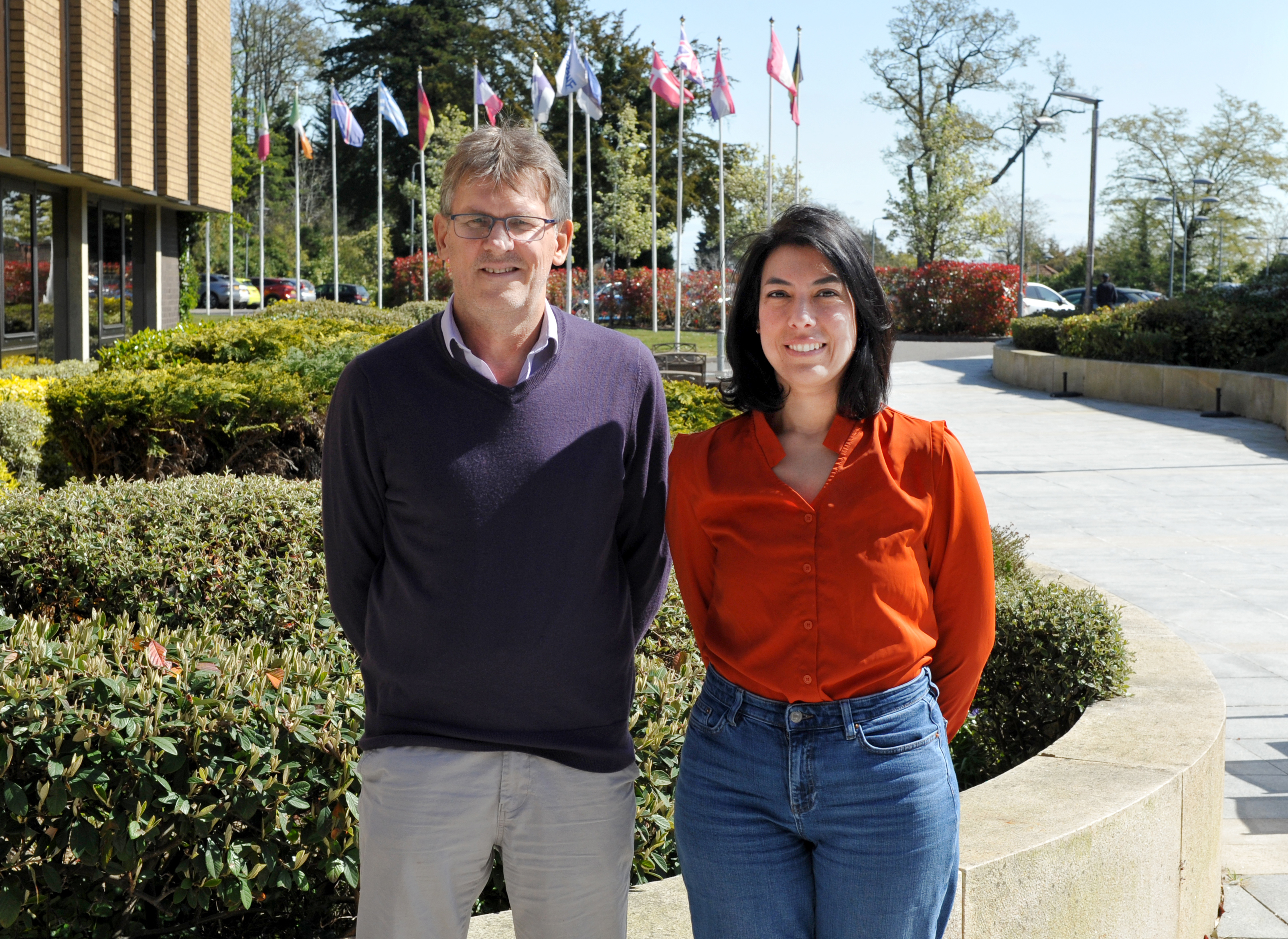Awards for Advancing Science 2024
James Murphy has been a pioneer in delivering future climate projections from the first set of transient climate projections to 2100, through near-term projections and high resolution downscaled regional projections to the most comprehensive set of probabilistic projections available.
James conceived, founded and led the quantifying uncertainty in model predictions project, that established the Met Office as a world leader in the design and production of probabilistic projections of future change, which are a critical tool for informing decision making. His strategic leadership has created increasingly sophisticated scientific foundations for four generations of the UK’s national climate change scenarios, from exploratory beginnings in the 1990s to the latest UK Climate Projections (UKCP18) land scenarios. These have transformed the landscape for decision-making in the UK. These have advanced the status of the climate projections from individual illustrations of “what might plausibly happen” into ensemble datasets expressing ranges of outcomes accompanied by their estimated likelihood of occurrence. This has equipped users with information to assess alternative adaptation options, weighing up risks of different outcomes against costs. These projections now underpin assessments of climate-related impacts and risks and adaptation decisions, made by thousands of UK stakeholders in applications affecting the natural and built environments, infrastructure networks, health, communities and businesses.
On the world stage, James has served as a lead author in the fourth IPCC assessment (IPCC AR4), contributing to its assessment of uncertainties in 21st century projections and co-led the development of European systems for near- and long-term climate projections in the EU-ENSEMBLES project, building on the pioneering decadal and probabilistic projects. He has led and/or contributed to around 100 papers and reports in specialised scientific journals and major national and international projects.
James’s work has provided the UK Government with the best climate information available to support UK and International decision making on climate change. His vision and leadership across the design, developments and delivery of these projects has been of the highest level and the UK Climate Projections are recognised worldwide as being the most comprehensive available. This enables UK decision makers to make well evidenced decisions on adaptation options.

Acceptance Message
I am delighted to receive the Symons Gold Medal for 2024 and humbled by the distinguished company of previous recipients that I am privileged to join. My career has coincided serendipitously with four decades of sustained development in the capabilities of climate models, allowing me to explore the potential of ensemble forecasting systems to enhance skill and characterise uncertainties in applications ranging from initialised monthly and decadal predictions to 21st century climate projections.
A key personal motivation has been to provide UK climate projections (UKCP) giving the most useful information feasible at any given time, while communicating the future potential for new capabilities or updated results as incomplete understanding is addressed steadily by the UK and international research communities. This progression is reflected through successive UKCP land scenarios, using initially the UK’s first global coupled simulation of climate change (that I ran in the 1990s) and then single-model realisations of spatially-detailed changes in 2002. We subsequently moved to multi-model probabilistic projections in 2009 that were updated in 2018 and augmented by sets of global, regional and local simulations to support flexible analysis of impacts and risks on infrastructure and society in the UK and beyond.
I am deeply grateful to many talented colleagues for their contributions to the development, implementation and documentation of the scientific ideas underpinning our projections, and to the Society for recognising this dedicated team effort as well as my role in steering it.
Mrs Fatima Pillosu and Mr Tim Hewson have made major advances in predicting precipitation on short- to medium-range timescales, illustrating how innovative post-processing techniques can significantly improve the reliability of rainfall forecasts from global NWP models. While ecPoint has not yet been integrated into ECMWF’s fully operational suite, it is currently run within ECMWF, underscoring its potential.
ecPoint’s principal development involves converting the coarse resolution of ensemble forecasts into probabilistic predictions at local scales. Through robust methods, the system addresses sub-grid variability, thereby enhancing the representation of intense, localised rainfall. This aspect is vital for capturing the small-scale features that can influence precipitation predictions and help prepare for flooding. This makes the product of particular interest to agencies concerned with flash flood risk management.
Although ecPoint is in a pre-operational or demonstration phase, it has already drawn a lot of attention for its practical value. It refines extreme rainfall forecasts that can help decision-makers, while also providing bias-corrected estimates at the grid-box level. By accommodating both gauge-scale extremes and broader bias correction, it addresses the needs of a wide range of user needs across the meteorological community.
In addition to the technical merits, Fatima and Tim have demonstrated a collaborative approach to research and evaluation. They have shared tools and results, enabling wider scrutiny and feedback. This effort has strengthened ecPoint’s foundation and underlined its capacity to advance methods in rainfall forecasting.
They have thus contributed significantly to improving rainfall predictions in contexts where accuracy is critical. Their work stands as an example of how investigative research can inform practice, even before a system becomes fully operational.
In light of these achievements, Mrs Fatima Pillosu and Mr Tim Hewson deserve the Hugh Robert Mill Award. Their focus on refining rainfall forecasts in a way that could improve decision-making and risk management, alongside their collaborative ethos, reflects the values this award seeks to recognise.

Acceptance Message
It is a great honour for us to receive the RMetS Hugh Robert Mill Award for Precipitation Research. We are truly grateful to the Society for this recognition.
Our work at ECMWF (the European Centre for Medium range Weather Forecasts) has focussed on developing ecPoint, a post-processing technique, to improve rainfall predictions for point (raingauge) scale, and to adjust re-analysis data to deliver compatible climate-related products. Our main goal was to help improve warnings of localised extreme rainfall, that can cause devastation and fatalities.
ecPoint delivers more accurate rainfall forecasts by adjusting raw model output according to the local weather situation. The underpinning calibration also brings fresh insights into model errors and rainfall distribution for model developers.
ECMWF provides the perfect environment, facilitating seamless progression from research on into user-oriented products. Work with the University of Reading is also crucial, for exploring hydrometeorological applications, such as flash flood risk prediction.
ecPoint outputs have received positive feedback from many hydrometeorological services, with testing, training and operational use activated in numerous countries worldwide. The fact that ecPoint provides tangible benefits for the wider society, especially in the Global South, reaffirms our motivation.
We could not have done this work in isolation. So whilst many have contributed, we extend special thanks to Florian Pappenberger, Axel Bonet, Estíbaliz Gascón, István Ihász and Ervin Zsótér for essential support, discussion, development and technical contributions. Meanwhile, we are very grateful to Hannah Cloke, Christel Prudhomme and Elisabeth Stephens for encouraging ecPoint analysis within Fatima’s PhD.
Adrian Matthews is a research leader in tropical atmosphere-ocean interactions leading major international collaborative projects and providing the inspiration and direction for innovative research studies. Climate systems in the maritime tropics – in regions such as the Indian Ocean and the maritime continent – require a multidisciplinary approach, with the ocean physics and dynamics being critical to the atmosphere and atmospheric dynamics. Consequently, Adrian’s work fits perfectly into the remit of the Adrian Gill Award.
Adrian has been principal investigator of Terra Maris: The Maritime Continent - Driver of the Global Climate System a major NERC funded project, running from 2018-2024, with researchers from the University of East Anglia, Leeds and Reading, as well as in Indonesia and Malaysia. Although the field campaign could not take place due to the COVID pandemic, Adrian led a pivot of the project team, focusing research on scientific studies using existing data sets, reanalyses, satellite-products and climate model output. Like a phoenix from the flames, a remarkable body of ground-breaking atmosphere-ocean science has emerged over the last five years.
Adrian has been a leading light in the UK community of climate researchers since the 1990s. His work is remarkable in embracing the scientific fundamentals of observations, models and theoretical concepts to understand coupled ocean-atmosphere systems deeply. His work during the Terra Maris project has broken new ground in understanding the fundamental physics of air-sea coupling in the “engine room” of the Earth’s climate. In particular, understanding of the diurnal stratification of the ocean boundary layer, its amplification of daytime sea surface temperatures and the consequent feedback on the Madden Julian Oscillation has been both elegant and important for modelling the system.
Adrian’s work has practical application to improving weather and climate prediction globally. He has also contributed to improving weather-forecasting services in Indonesia, Malaysia, the Philippines and Vietnam, e.g., delivering in-country training workshops and evaluating model forecasts of extreme precipitation.
These recent successes have been built on a long record of multidisciplinary work, and a track record of inspiring his students and postdocs. For example, his earlier work on the Madden Julian Oscillation brought genuine insight into the complexities of this coupled system. Other multi-disciplinary research strands on meteorology-volcano interactions have been truly pioneering.
Adrian is an inspiring lecturer and supervisor of research students. Of course, much of Adrian’s research is collaborative and has involved working with excellent research staff and students both in the UK and overseas. Indeed, he has a reputation for outstanding mentorship and supervision, demonstrating excellent supervisory and collaborative skills and allowing those he works with to flourish. Adrian is a worthy winner of the RMetS Adrian Gill Award.

Acceptance Message
I am deeply honoured to receive the Adrian Gill Award and would like to extend my sincere thanks to the Royal Meteorological Society and my nominators for this recognition. Over the past decade, there have been remarkable advancements in our ability to simulate and predict tropical weather and climate systems, along with a deeper understanding of the extreme weather events often associated with them. These progressions have been driven by new observational field campaigns and developments in modelling, particularly the emergence of large-domain convection-permitting atmospheric models in the tropics. Such systems demand a multidisciplinary approach, as ocean physics and dynamics frequently play a crucial role in shaping atmospheric behaviour. I have been fortunate to collaborate with many scientists across the UK and Europe and partner countries in South Asia and the Maritime Continent, exploring various aspects of these ocean-atmosphere interactions. It has been especially rewarding to mentor and inspire the next generation of scientists in this expanding field.
Professor Manoj Joshi is a highly original and innovative leader in the field of Climate Dynamics. He uses theories and models to solve problems driven by high-impact issues such as climate change and conducts inspiring interdisciplinary science that connects terrestrial meteorology to other fields including oceanography, aerosols, atmospheric electricity, the land surface, and the climate and atmospheric circulation of other planets.
Manoj’s pioneering work covers a remarkable breadth. He has many studies on the causes and mechanisms of large-scale physical patterns of climate change and their impacts but also connects meteorology to other topics such as low frequency variability in ocean tides, ocean atmosphere interaction and the effects of chlorophyll on the ocean and climate and even extending to the global electric circuit. Manoj has a rare level of interdisciplinary expertise, has published important early work on the climate of Mars and exoplanets and connects his climate expertise to the vibrant astrophysical community studying exoplanets. For example, he recently published key work using terrestrial analogues to understand the climate and habitability of tidally locked extrasolar planets and used analogies between aerosols in terrestrial climate and aerosols on exoplanets to infer aspects of exoplanet climate and habitability.
Professor Joshi has published over a hundred peer-reviewed studies. His work is truly interdisciplinary and his papers over the last five years alone have appeared in a wide cross section of scientific journals ranging from the Astrophysical Journal to the Journal of Physical Oceanography, as well as Society journals including the Quarterly Journal of the Royal Meteorological Society and the International Journal of Climatology.
Professor Joshi is unusual, if not unique, in his interdisciplinary expertise and his key findings across the boundaries of meteorology and other scientific fields make him a very worthy recipient of the Adrian Gill Award.

Acceptance Message
I am extremely honoured to accept the 2024 Adrian Gill Award for Advances at the Interface of Atmospheric Science and Related Disciplines. It really is humbling to be acknowledged alongside the many talented individuals who have previously received this recognition.
My research merely reflects the fact that there are many exciting fields lying adjacent to the vibrant area of meteorology itself- from oceanography and planetary science to electricity and the impacts of climate change. To be a small part of the communities that apply meteorology to these realms- including the now maturing field of exoplanet climate- has been a privilege. This achievement is not mine alone, but represents shared efforts involving colleagues and peers from academia to the civil service- and their energy and wisdom has been a constant source of inspiration. I can add my voice to those many others who acknowledge that science, especially a somewhat applied science like ours, is mostly a collective endeavour, and I am fortunate to interact with a number of dynamic communities. I thank the Royal Meteorological Society for this award.
Dr Eunice Lo is a globally recognised climate scientist whose innovative research bridges meteorology and epidemiology to understand the human health impacts of extreme weather. Her exceptional contributions to climate, and how it impacts the health of communities around the world are what led her to this L F Richardson Award. She was also recently awarded an Emerging Leaders Prize from the Medical Research Foundation.
Based at University of Bristol and with a PhD in Meteorology from the University of Reading (2018), Dr Lo has built an outstanding publication record with 32 scientific papers to her name. She is playing a crucial role in the 4th UK Climate Change Risk Assessment, as well as contributing to the IPCC Sixth Assessment Report. Her work has been important in quantifying the current and future mortality impacts of temperature extremes, including the impacts that are attributable to anthropogenic climate change.
In 2023, Dr Lo published a paper titled “Optimal heat stress metric for modelling heat-related mortality varies from country to country”, in the International Journal of Climatology. She solved a long-standing issue in the field by finding a version of heat-stress that best identifies negative human health outcomes around the world. Her findings have made risk assessments and summaries of weather impacts more accessible and actionable to communities that matter.
Dr Lo’s innovative research is not only advancing scientific frontiers but also providing essential information to reduce risks to human health in a changing climate. Her contributions make her a truly worthy and distinguished recipient of this prestigious scientific award.

Acceptance Message
I am very happy to receive the L F Richardson Award from the Royal Meteorological Society. The excellent research published in RMetS journals has been a vital resource for my own understanding of the field, so being recognised for advancing science within this community is an absolute honour.
My work at the University of Bristol has focused on extreme weather and its impacts on human health. It is incredibly exciting to conduct research in this rapidly emerging field alongside the Bristol Climate Dynamics Group, the Cabot Institute for the Environment, the Elizabeth Blackwell Institute for Health Research, and collaborators from other disciplines such as social sciences and the public sector.
This award recognises a global heat stress-mortality paper that I published in 2023. The paper would not have been possible without the contributions of a consortium of collaborators from 12 countries. I would like to thank and share this award with all my co-authors. I look forward to sharing more of my research through RMetS journals and events, which have been successful in fostering a truly supportive community—one that I am grateful to be part of.
Ned is an exceptional new research scientist who displays drive, judgement and insight far beyond his years of experience. He graduated with first class Honours in Physics from Southampton University in 2020 and completed a PhD at Exeter University before working as a Postdoctoral Research Associate at the Max Planck Institute in Germany and now as a research scientist at the Met Office. Ned is already a very productive scientist who recently published ‘Underpredicted ENSO teleconnections in seasonal forecasts’ in Geophysical Research Letters as part of his PhD work. This paper shows the surprising result that there is a large underestimate in the strength of ENSO teleconnections in seasonal forecasts of the extratropics. Ned’s second research paper, published in the Quarterly Journal of the Royal Met Society, shows the equally important result that as ocean model resolution is increased, some of the longstanding errors in the El Niño Southern Oscillation are alleviated, with important knock on benefits for the structure of modelled extratropical teleconnections. This work shows a clear benefit of higher resolution that can be used to gauge the cost-benefit of future model and forecast developments.
Ned well understands the historical context of his results and the impact of historical climate extremes relevant to his research. By investigating the existing scientific literature and thoroughly understanding previous papers on seasonal forecasting and the predictability of the extratropics, he has clearly identified where his results are novel and important. Ned also understands the historical context of his work and his public seminars and presentations have nicely framed his research in the context of disruption from historical winter cold snaps and other extreme weather and climate events.
Ned is an excellent communicator and has presented his results in very high-profile settings for an early career scientist, including international conferences (EGU and IUGG) and an ICTP summer school on ENSO and its teleconnections. Unusually for such an early career scientist, Ned has also given multiple invited talks, for example at the RMetS Scottish local centre and the University of East Anglia. Ned also takes a very active part in a diverse range of outreach activities such as British Science week and Exeter Pint of Science and he helped to organize two RMetS early career scientist conferences as well as being a member of the RMetS Early Career Special Interest Group. He was also a finalist in both the 2022 STEM for Britain government science competition and the 2022 Institute of Physics Three Minute Wonder competitions where he presented his research.
Dr Ned Williams makes an excellent winner of this year’s Malcolm Walker Award.

Acceptance Message
I am delighted and hugely grateful to receive the Royal Meteorological Society’s Malcolm Walker Award for 2024. I am very fortunate to be able to work in climate prediction, a rapidly developing field where fundamental research in the physics of the Earth system and the climate information needs of society collide.
I am privileged to have had great mentorship through my scientific journey so far. I am particularly grateful to my PhD supervisors Adam Scaife and James Screen, who gave me the opportunity to work in climate science and guided me through the start of my career. I was then fortunate to experience researching abroad with a postdoctoral position in Hamburg, Germany, before joining the Met Office.
I am grateful for RMetS, whose support for early career researchers is outstanding. Attending and then helping to organize the Early Career and Student Conferences during my PhD allowed me to develop a strong network of peers and bolstered my enthusiasm for weather and climate science, and I have greatly enjoyed being a member of the society’s Youth and Early Career Special Interest Group since 2022. It is a great honour to stand among the excellent company of past and future Malcolm Walker Award winners.

